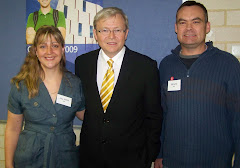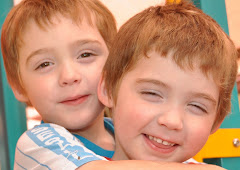 When we attended the Autism SA Awards Ceremony that took place on Wednesday 27th May 2009, we had the pleasure of listening to Matt Deighton's (Editor of Messenger Community News) speech.
When we attended the Autism SA Awards Ceremony that took place on Wednesday 27th May 2009, we had the pleasure of listening to Matt Deighton's (Editor of Messenger Community News) speech. Matt's speech was so touching and completely resonated with Shane & I because we were going through the same experience as his family at the same time. It felt like he was telling our story! Being the parent of a child with autism is not in the least an easy journey because unfortunately there isn’t enough support for families like ours, but I do know that the situation will greatly improve in the not too distant future. This will happen in large part due to wonderful people like Matt who speak openly about the important issues associated with autism.
You can see our daughter singing at the rehearsal for the Awards Ceremonly by clicking the this link: http://www.youtube.com/watch?v=hA2VOuaN64g. We are still so proud of her. You can also see photos from the Awards Ceremony in earlier posts.
Here's Matt's speech.....
SITTING in the offices of Autism SA the other day, helping to judge these awards, it really made me reflect on how special the autism spectrum community is in South Australia.
Normally when I judge awards, they’re to do with the media. Pretenders and imposters are very easy to detect. Alas, I had no such luxury as I sat around the table with Karl, Hannah, Jessica and David.
Put bluntly, there was not a dud entry among them. All were incredible. All worthy. All deserving of recognition.
So, firstly, a hearty congratulations to all nominees – you are a credit to yourselves and you have done more than you will probably ever know to advance the cause of autism in your communities, and in this state.
Over the next few minutes, I’ll talk to you about how I see autism from the media’s perspective and touch briefly on my own personal experiences.
Firstly, I’ll preface this speech by saying how saddened I was to hear the respite centre in the Onkaparinga Hills burnt down earlier this week. Much of my speech is dedicated to the battle to have that centre built. What I will say now is that the Messenger will be there to support you as that centre is rebuilt.
As editor of Messenger Community News, I have enjoyed a fairly privileged perspective on autism. I see how autistic children and their parents are perceived by the wider community, I see the challenges they face and, so often, overcome.
I get to meet with people like Jon Martin, Karl Zander and Elizbaeth Davis, and pick their brains about what influence we in the media can have on the autism debate. And I would like to think our papers have the ability to help change community perceptions and influence public discussions – duties I treat with great care and respect.
Messenger first really entered the autism debate in 2004 when a plan by Autism SA and the Variety Club to establish a respite centre for autistic children and young adults in Seaford met with a hostile reaction from surrounding residents. At the time, I had little more than a working knowledge of autism.
But this made me angry. And I knew enough to know these children and their families did not deserve to be treated like pariahs.
Many would argue the role of the media is to be unbiased and report, fairly, both sides of an issue. Most of the time this is true. The exception is when we come up against an argument so wrong, so small-minded, so obscene that it demands we take a stand, fight against intolerance and fly the flag for the vulnerable and disadvantaged. So we picked a side.
Your side.
So, for the next five years, we delved into the issue, spoke to the families, got to know Jon and his team and wrote strong, heart-felt comment pieces in support of the children, their parents and families.
We followed Autism SA as it shelved its Seaford plan and then felt forced to abandon a second plan for a centre in Woodcroft in 2005, following a similarly outrageous community reaction.
In 2006 we wrote this: `` The ignorance about the disability and the ``not in my backyard'' attitude taken by many opponents is a sad reflection of the attitudes of some people living in the south. Australia is said to be the lucky country. But not everyone is born equal. Carers of autistic children should be supported by the southern community and recognised for the challenges they deal with on a daily basis in trying times - not written off as bad parents. The more we can understand about autism then the greater our tolerance and acceptance will be.
We celebrated as hard as anyone when the respite centre finally opened in the Onkaparinga Hills earlier this year. And we were equally stunned when we received the terrible news on Monday. However, this must not detract from the huge strides we have all taken.
Overall, I think Messenger’s coverage of autism has highlighted the true power of the media and shown how we can have a positive impact on behalf of our communities.
I would like to think it helped break down community stigmas about autism and revealed these children and adults as the wonderful, beautiful, often quirky, but unique people they are.
Today, Messenger’s relationship with Autism SA has reached a new level and we actively support Autism Awareness month. This is something I now view as an annual commitment.
And our campaigning journalism does not end with the opening of the respite centre. Today, the autism community continues to face major hurdles.
As our papers reported earlier this month, parents are being forced to wait more than a year to find out if their child has autism and a further 12 months to access vital early intervention programs.
This is outrageous.
And, while there remains much focus on early intervention, the transition to school is equally problematic. There are too few special small classes in our state schools.
It is wrong that children who qualify for a place in a special small class can miss out due to long waiting lists and be forced to flounder in the mainstream system. It is wrong that there is no clear transition process from primary to secondary school. It is equally outrageous – on so many levels - that autistic children remain among the most bullied and persecuted in our school system.
So, yes, we have many important challenges to face. But judging on recent experiences, they are challenges we will face and win. In conclusion, reflecting on the campaign for the Autism SA respite centre, I think it also highlights that God is not without a sense of humour.
On the 7th of July, 2004, the very first story on the Autism SA battle appeared in Messenger newspapers. The very next day my first son, Zachary John, was born.
He is autistic.
Thank you.


.jpg)





